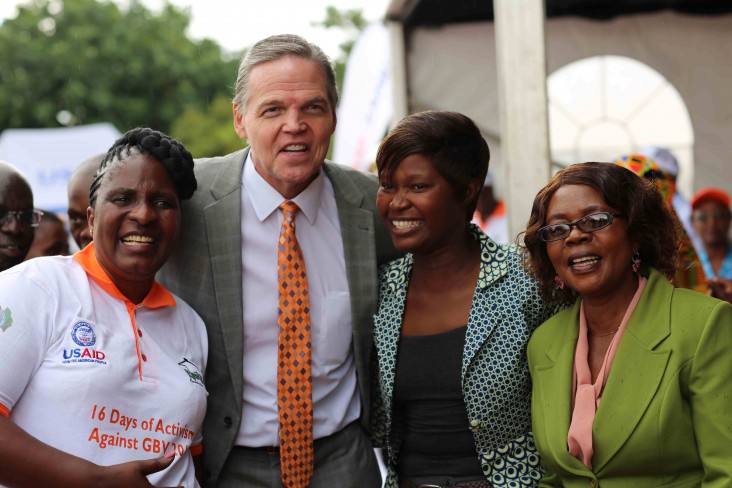Speeches Shim

Remarks by U.S. Ambassador Daniel L. Foote
Launch of the Annual 16 Days of Activism Against Gender-Based Violence
(Remarks as prepared)
Honorable Elizabeth Phiri, Minister of Gender
Honorable David Mabumba, Minister of General Education
His Worship Miles Sampa, Mayor of Lusaka
Inspector General of Police, Kakoma Kanganja
Representative of the House of Chiefs Teachers, students, parents, and community members
Ladies and Gentlemen
Good morning. It is an honor to join you today to commemorate the International Day for the Elimination of Violence Against Women and help launch the annual 16 Days of Activism Against Gender-Based Violence. Gender-based violence, or GBV, in all of its forms hinders Zambia’s development and prosperity.
Violence against girls and women is one of the most widespread, persistent human-rights violations in our world today. Whether it is intimate-partner violence, sexual violence, harassment, trafficking, or child marriage, GBV prevents victims from reaching their full potential. It is our duty and collective responsibility to join together as a community to combat those who perpetrate this criminality and provide support to the victims.
The physical and psychological effects of GBV are devastating. They lead to poor educational and economic outcomes, increase the rate of infectious diseases, like HIV, and perpetuate the cycle of poverty.
In Zambia, GBV remains a formidable barrier. The 2014 Demographic and Health Survey reported that 47 percent of Zambian women have experienced physical, sexual, and/or emotional violence from their current or most recent partner.
Furthermore, the 2014 Violence Against Children in Zambia Survey reports that one in three females have experienced physical or sexual violence before the age of 18. These numbers are far too high, and we all need to act to reduce them.
Since 2005, the U.S. government has partnered with Zambia to prevent GBV in families and communities, and we continue to work hand-in-hand to increase support for gender equity, to strengthen GBV-response services, and support the laws and policies that ensure protection for survivors and justice for perpetrators.
Together, we have established 24 fully operational one-stop centers for comprehensive GBV response and care. We have trained magistrates, police officers, and doctors to improve access to justice for child survivors. We have challenged GBV norms through the widespread implementation of evidence-based programs, and together, we have trained close to 100 chiefs and 340 headmen, induna, and traditional leaders to identify and respond to GBV in their own communities.
As we reflect on these notable accomplishments, we must acknowledge Zambia’s House of Chiefs, Ministry of Chiefs and Traditional Affairs, and Ministry of Religious Affairs for their partnership in this endeavor. The critical role that Zambia’s faith and traditional leaders play in the collective fight to end GBV cannot be understated. We commend you for your efforts, and we are honored to partner with you for a more gender-equitable Zambia.
Looking forward, the U.S. government remains deeply committed to ending GBV in Zambia. Through our current U.S.-funded STOP-GBV project, implemented by the Zambian Center for Communications, we continue to build on past accomplishments. In addition, our new Faith and Communities Initiative will focus on building the capacity of faith and traditional leaders to combat GBV within their communities, focusing on prevention of sexual violence against children ages 9-14.
In turn, we ask the Zambian government to support these initiatives by increasing GBV programs in schools, fully operationalizing the 2011 Anti-GBV Act, and integrating GBV programs into all Ministry of Health clinics to respond better to the needs of survivors across the country.
Again, it is a privilege to join you on this important day and my deepest thanks to all who have joined the fight against GBV. Thank you.

Comment
Make a general inquiry or suggest an improvement.